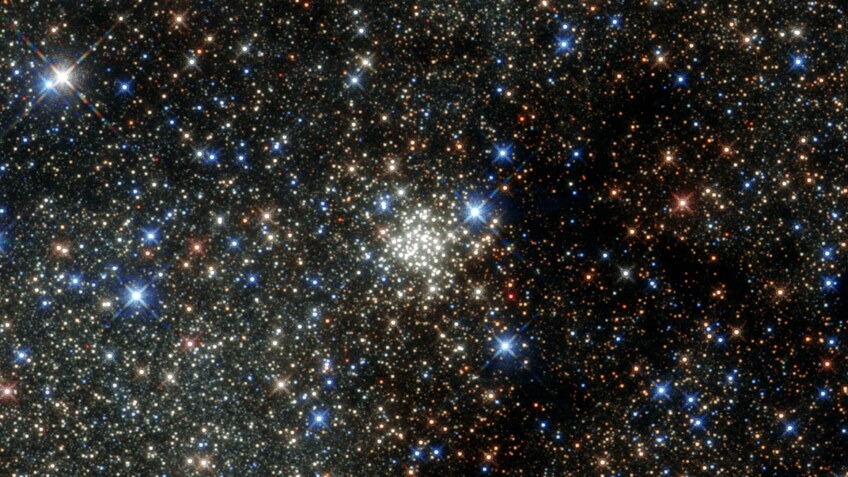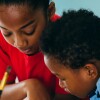Ideas for Joyful Learning During School Closures: Explore the Cosmos
Last week, we shared ways that you and your family can celebrate the Earth. This week, we set our sights upwards, toward the stars! Whether your kids are budding astronauts, love to stargaze, or are newly curious about what’s up in the sky, there is so much to learn and explore about the universe. The education staff at PBS SoCal and KCET want to share some out-of-this-world activities and resources to help you and your children explore the wonders of space and sharpen STEAM skills.
Because as PBS superstar Carl Sagan once said … “we're made of star stuff.”
Ideas for Early Learners (Pre-K–3rd grade)
Get to know the solar system by making a beautiful salt painting of our planets. You’ll just need some paper, white glue, food coloring or paint and salt. Use the provided solar system PDF to learn about the order of the solar system. After your salt painting dries, label the planets. Help your child to do more planetary research. How are these planets different from each other? How does their distance from the sun create their unique characteristics?

Have you ever observed the Moon and noticed how it changes every day? This week, you will see more of the Moon light up with each passing day. At the beginning of the week, more than half of the Moon will be in the Earth’s shadow, blocking light from the sun. Each day, the Moon moves out of the shadow, so we see a bit more of its sunlit side. Enjoy the waxing crescent Moon until Thursday April 30. On May 1, more than half of the Moon will be illuminated, with the Moon becoming more illuminated each day until the full Moon May 7. In this phase, the Moon is called a waxing gibbous. Learn more about the other phases of the moon in this article from National Geographic Kids.
- Observe: Use this printable Moon Observation Journal to track and record your moon-derful observations.
- Experiment: NASA’s Jet Propulsion Laboratory (JPL) shows you how to make a Moon craterwith common pantry items.
What if you lived on another planet in a galaxy far away? Imagine what life would be like. Think about what the weather and what the people who live there do for fun or eat for dinner. Invent your own planet in this fun, printable "Ready Jet Go!" activity using the provided Bortronian Power Cube template.
Try building your own rocket ship. For this out-of-this-world craft, you’ll make a pulley system that sends your colorfully decorated rocket ship soaring into space. This activity can be a great way to learn about simple machines and think about ways to change how your rocket moves depending on its weight.
Help Peg and Cat find everything they lost in space with this printable look-and-find activity.
Play The Cat in the Hat’s Great Space Chase to explore planets and collect items from outer space.
Watch this video to learn more facts about space: Space Compilation: Crash Course for Kids
For more space-related fun, explore the solar system and constellations with Jet and his friends in the Ready Jet Go! Space Explorer App.
The education team at PBS SoCal has put together a sample schedule that you can use to inspire your learning routine at home.
Ideas for Older Children (4th Grade-12th Grade)
Our friends over at NASA’s Jet Propulsion Laboratory (JPL) created some great activities for us to learn more about space and practice those engineering skills!
- Design your ownmoon lander, and see if it can withstand its own touch-down!
- Learn about NASA’sPerseverance Mars Roverand how it will carry the first helicopter to the surface of Mars! Feeling inspired? Build your own Paper Mars Helicopter.
- Track the phases of the Moon with this Moon Calendar and Calculator! The calendar will tell you approximately where and when you can see your favorite Moon phase. After you complete the project, test it out by taking a lovely moonlit stroll with your family!
Take a field trip around the universe using NASA’s Image Gallery. We love to travel along with the Hubble Space Telescope and explore our galaxy and other galaxies far, far away!

For the budding rocket scientists out there, JPL space explorers shared their favorite NASA images in this article about The Space We Love. You can see some incredible images, and learn some important space history lessons too!
Have an intergalactic dance party with these space-themed playlists from PBS SoCal’s Spotify playlist as you step away from screens and rock out to these songs. Are we missing some of your favorite space jams? Have the whole family collaborate on your own space-themed playlist!
PBS has a history of opening audiences’ eyes to the wonders of the universe with shows like “Cosmos” (produced right here at KCET). That tradition continues with these digital series that explore space:
- Learn about cutting-edge research in STELLAR, a six-part mini-series that takes you on a “cosmic road trip” to visit astronomy research labs across the U.S. and learn what mysteries of the universe scientists are tackling right now.
- Crash Course Astronomy is a go-to guide for all your questions about space! From the planets, stars and galaxies to explaining concepts like the Big Bang and the age of the universe, this Crash Course will make kids space experts.
- For the extra curious, check out Space Time, where the astrophysicist host, Dr. Matt O’Dowd, explores questions and mysteries of anything that exists beyond planet Earth!
We want to hear from you! We would love to see photos of you doing these activities with your family. Email your photos and stories to education@pmgsocal.org.




